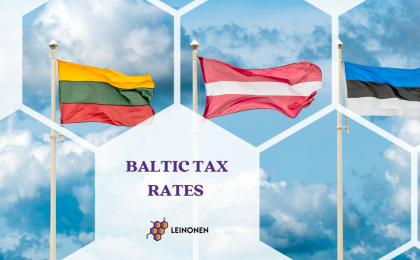| Estonia | Latvia | Lithuania |
|---|---|---|
| Submission | ||
| All entities are obliged to submit an annual report within 6 months from the end of financial year. The financial year is 12 months in length and in most cases the financial year is the calendar year. | A company shall, not later than one month after approval of the financial statement, submit it to the State Revenue Service within the following time limits: a micro-entity – not later than five months after the end of the reporting year.a small undertaking – not later than five months after the end of the reporting year.a medium-sized undertaking, a large undertaking, and a parent undertaking of the group of companies that prepares a consolidated annual statement – not later than seven months after the end of the reporting year. | The approved financial statements, together with the management report, the auditor’s opinion (if an audit is mandatory), and, where applicable, the assurance statement on sustainability reporting, must be submitted to the Register of Legal Entities no later than 30 calendar days after their approval. The deadline for the approval is 4 months from the end of the financial year. |
| Preparation | ||
| The management board of the company is responsible for preparing the annual report with a proposal for the distribution of profit and presenting it to the shareholders. Pursuant to the Accounting Act, the management, the shareholders or the sole proprietor certify the accuracy and completeness of the information presented in the annual report, including that the annual accounts have been prepared in accordance with the financial reporting standard and give a true and fair view of the financial position, financial performance, and cash flows of the accounting entity. Before the annual report can be submitted to the commercial register, the report has to be approved by the general meeting of shareholders. The approval has to be in a format of a decision of the shareholders or minutes of the meeting of the shareholders. If the shareholders do not approve the annual report and it is not submitted to the commercial register on time, the company will be in breach of its obligation to provide information to the register. However, in case the shareholders have not approved the annual report with a decision in a timely manner, the management board can submit the annual report to the commercial register with a public indication that the report has not been approved. The commercial register will consider the obligation to file an annual report fulfilled, but once the shareholders decide to approve the report, a new annual report must be submitted to the commercial register. The meeting of shareholders or the general meeting of shareholders of the company may simultaneously adopt resolutions on the approval of the annual report and distribution of dividends or resolve the payment of dividends later. | Financial statement of a company shall be signed by all the board members or a specific board member, who has been authorised by the whole board to do so. Next, financial statement of a company shall be approved by the shareholder’s meeting (if there is more than one shareholder) or by the sole shareholder with its decision. | Pursuant to Article 13 of the Law on the Accountability of Companies and Groups of Companies of the Republic of Lithuania, legal entities are required to prepare annual financial statements after the end of the financial year based on the data as of the final day of the reporting year. These statements must accurately disclose the company’s assets, equity, liabilities, revenue, expenses, and, where applicable, cash flows. A private limited liability company or a public limited company must convene an annual general meeting of shareholders to approve the annual financial statement package, in accordance with Article 24 and 58 of the Law on Public Limited Liability Companies. According to Article 223 of the Code of Administrative Offences, failure to submit, late submission, or incorrect submission of annual financial statements, management reports, activity reports, annual reports, auditor’s opinions, or other legally required documents may result in administrative liability. Legal persons, their branches or representative offices, as well as managers of foreign legal entities or their divisions, may be subject to a fine ranging from EUR 600 to EUR 1450. In the case of repeated offences, the fine ranges from EUR 2000 to EUR 6000. |
Payment of dividends and taxation
| Estonia | Latvia | Lithuania |
|---|---|---|
| Payment of dividends | ||
| According to the Commercial Code the shareholders of the company may pay out dividends in money from net profit or from retained profit from previous years from which losses from previous years have been deducted, on the basis of the approved annual report. Dividend can also be non-monetary, for example securities or real estate and the date of payment according to the tax authorities will be considered the date of transfer of ownership. Overall rule is that dividend will be paid to the shareholders in proportion to the nominal value of the shareholders’ share. Most commonly the dividends will be paid by a payment date set by the shareholders’ decision or by the articles of association, or within a reasonable time. The shareholders can decide on the dividend payment when they approve the annual report, but it is not mandatory. The shareholders can also decide to take out dividends as many times as they want, as long as all the grounds for paying the dividends are fulfilled: The share capital of the company is fully paid.The approved annual report shows profit which can be distributed (either current financial year and/or previous financial years).The shareholder has made a decision to pay the dividends.Payment of dividends cannot damage the solvency of the company, and the equity must remain at least half of the share capital amount. | The process of decision-making as of payment of dividends is as follows. The board of the company convenes the ordinary shareholder’s meeting proposing to approve the annual statement of the company and to decide on profit distribution. The board of the company shall ensure that the shareholders have access to the proposal. Commercial Law lists the items which shall be included in the proposal. After the shareholder’s meeting is held and the minutes of the shareholder’s meeting are signed, there is a legal ground for payment of dividends to the shareholders of the company. Normally, dividends shall be paid out to a shareholder in proportion to the sum of the nominal values of the shares owned by him or her (10 % of the shares are entitled to 10% of the distributable profits). However, the articles of association of a company can provide for different provisions (for instance, applying different coefficients to different classes of shares etc.). Commercial Law also provides for a possibility to pay out extraordinary dividends. Such an option shall be stipulated in the articles of association of the company allowing dividends to be determined and calculated also from the profit acquired during the period after the end of the previous reporting year. Dividends are allowed to be calculated and paid out only for fully paid shares. A shareholder is not entitled to receive dividends from the company if the shareholder has not provided information to the company about the ultimate beneficial owner of the shares in question in accordance with the applicable KYC/AML laws. Dividends may not be determined, calculated, or paid out if the annual statement or the report on economic activity shows that the company’s own funds are less than its share capital. Dividends shall be paid out only in cash (money) – it is not possible to pay out dividends substituting money with some tangible or intangible property. Dividends which have not been taken out within 10 years will be transferred back into the ownership of the company, except when, pursuant to the law, the limitation period is deemed to be discontinued or suspended. The decision of the shareholders of the company that the dividends, even temporarily, are to be left at the disposal of the company will be void and not executable. The company may not request a shareholder to return dividends that have been received, except in cases where an obvious mistake was made or it is determined that the shareholder was not legally entitled to the dividends paid. | According to Article 59 of the Law on Public Limited Liability Companies, a decision to pay dividends may not be adopted if: · the company has overdue financial liabilities. · the distributable profit for the reporting year is negative. · the payment of dividends would reduce the company’s equity below the amount of its authorized capital, mandatory reserve, or other statutory minimum levels. The law also clearly states that dividends may be paid only from distributable profit – that is, the remaining portion of profit after mandatory deductions, including the formation of reserves and the covering of previous years’ losses. |
| Taxation | ||
| Starting from January 2025, dividends are taxed at the company level in Estonia with an income tax at the rate of 22/78, meaning that the tax rate is the same for paying the dividends to either natural persons, legal entities or tax haven companies. | For individuals: Dividend income is subject to personal income tax (PIT) rate at 25,5%, however, dividend income shall be exempt from PIT if dividends distributed from profit were subject to taxation at the company level in Latvia or abroad. In addition, 3 % PIT rate on annual income exceeding EUR 200 000 is applied. For legal entities: All undistributed corporate profits are tax-exempt. For distributed profit corporate income tax (CIT) rate is 20%, calculated as 20/80 from taxable net payment (actual tax burden – 25%). CIT is not assessed on the profit earned, which means no CIT in respect to all retained and reinvested profits is applicable. CIT is assessed on a monthly basis and only when profits have been distributed (e.g. dividends, capital reductions, liquidation quota), including transactions that are considered as deemed profit distributions (e.g. transfer pricing adjustments, provisions for bad debts, in certain cases issued loans to related parties, expenses and payments that do not have a business purpose, gifts and business entertainment expenses, representation and personnel sustainability expenses exceeding 5% of the previous tax year total gross salaries). For tax haven companies: All payments to low tax or tax free countries are subject to CIT at a rate of 20% (calculated as 20/80, actual tax burden – 25%). Dividend income paid from profits of companies registered in low tax or tax-free countries or territories is subject to PIT at a rate of 25.5%. PIT is applied to income from substantial participation in low-tax and tax-free countries or territories’ companies, trusts, or other legal entities. Tax is levied on the foreign company’s income attributable to a person if the person’s participation in the foreign company is substantial – 25% or more – regardless of whether this income has been distributed as dividends (if the taxed income is distributed as dividends, PIT on dividends will not be paid again). | For individuals: According to PIT Law, dividends are considered income from distributed profits. This means that dividends are only taxed when they are paid out. Until dividends are not paid, they are not taxed. The tax rate is 15 %. For legal entities: Dividends distributed by a Lithuanian company to another company are subject to a 16% corporate income tax (CIT) rate from 1 January 2025, withheld by the distributing company. It should be noted that from 1 January 2026, the rate will increase to 17%. According to the principle of participation exemption, dividends paid by the company to another Lithuanian or foreign company or received from a foreign company shall not be subject to CIT, if the company receiving the dividends holds at least 10 % of voting shares (interests, member shares) for at least 12 months without interruption. This rule is not applicable it receiving / distributing company is set up in tax haven. Dividends distributed by a foreign company to a Lithuanian company are exempt from CIT if the distributing foreign entity is established in the European Economic Area and related profit is properly taxed in the domiciled country. N.B. When a Lithuanian company pays dividends to a non-resident (either individual or legal entity), the provisions of Lithuania’s domestic law and applicable double taxation avoidance treaties (hereinafter – DTT) must be considered. DTTs may provide for a reduced dividend tax rate. In such cases, under Article 5 of the Law on Tax Administration, treaty provisions take precedence. |







